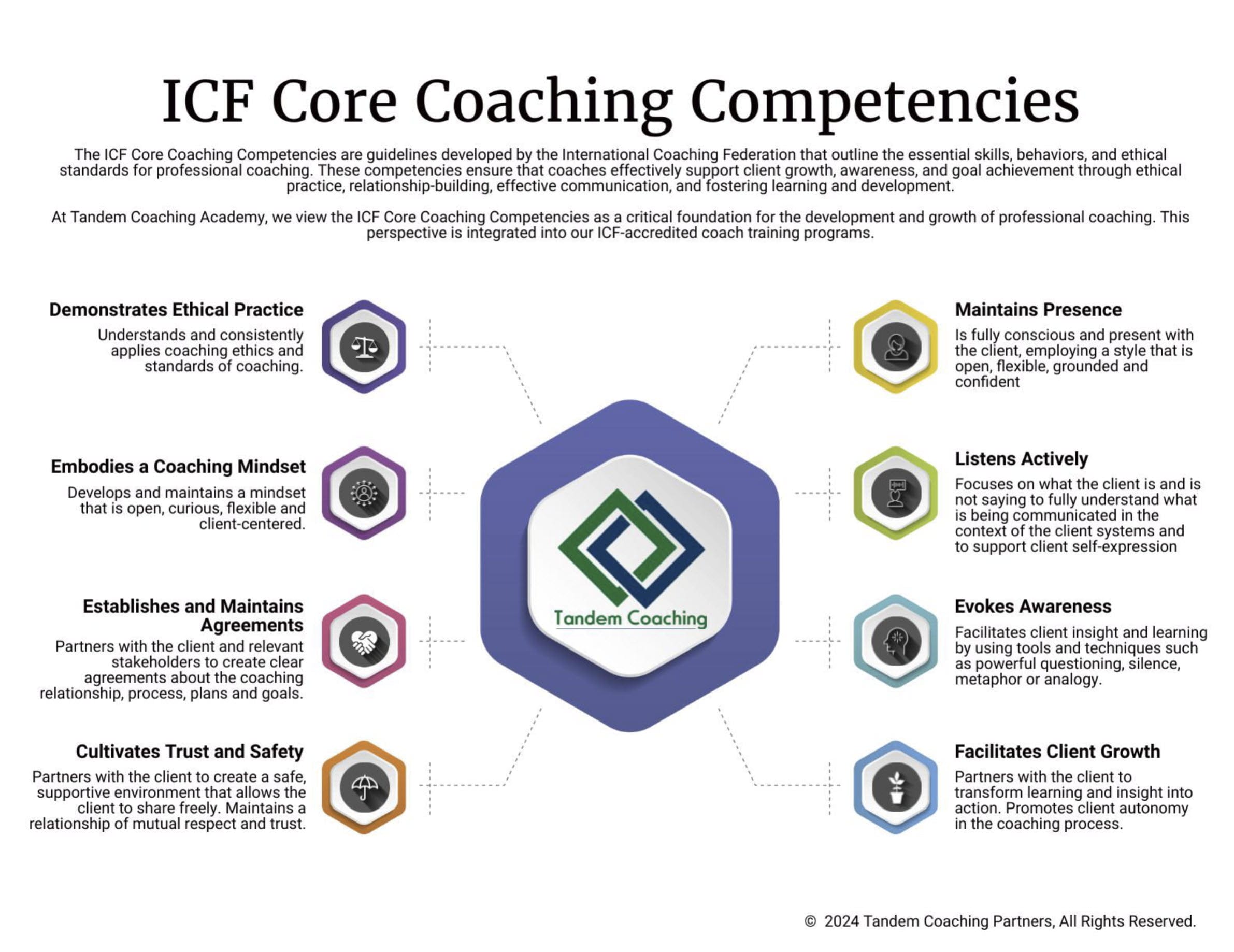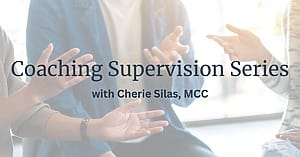Did you know that the ICF Credentialing Exam requires a passing score of 77% (460 out of 600), making it one of the more challenging milestones for aspiring coaches?
If you’re preparing for this exam, you’re not alone in feeling the pressure. Whether you aim for ACC, PCC, or MCC certification, this exam is a critical step in your journey.
But here’s the good news: with the right strategy, study materials, and a clear understanding of the exam’s structure, you can meet this challenge head-on. In this blog post, we’ll break down everything you need to know about the ICF exam, from its format to preparation tips, so you can confidently approach your certification journey.
Are you considering getting an ICF Credential? Contact us to guide you to the right one for you and your career.
Take the Exam Sample Text for FREE Now
"*" indicates required fields
How is the New ICF Credentialing Exam Different?
In recent years, the ICF has updated its credentialing exam to better align with modern coaching practices and the latest research in the field. The new ICF Credentialing Exam now tests a coach’s knowledge of and ability to apply the updated eight ICF core competencies, the ICF code of ethics, and the ICF’s definition of coaching.
Unlike previous versions, the exam is scenario-based, challenging candidates to apply their knowledge in realistic coaching situations. This shift emphasizes not only theoretical knowledge but also practical application, making the exam a true measure of a coach’s readiness to serve clients effectively.
The transition to a more secure and standardized testing format, delivered in partnership with Pearson VUE, ensures that each candidate has a fair and equal opportunity to demonstrate their competencies. This update reflects ICF’s commitment to maintaining high standards in the coaching profession, ensuring that all credentialed coaches are well-prepared to meet the demands of their clients.

What is the Format of the Exam?
The ICF Credentialing Exam is structured around 81 situational judgment items, each presenting a coaching scenario with four response options. For each scenario, candidates must identify the best and worst actions among the provided options. This format assesses a coach’s decision-making process and ability to apply core competencies in real-world situations.
The exam is scored on a scale from 200 to 600, with a passing score set at 460. The use of situational judgment questions ensures that the exam goes beyond simple knowledge recall, instead testing the practical application of coaching principles and ethical guidelines.

ICF Exam Requirements
To be eligible for the ICF Credentialing Exam, candidates must fulfill specific prerequisites that vary depending on the level of certification they are pursuing.
- Training Hours:
- ACC coach certification training program: At least 60 hours of coach-specific training
- ICF-PCC coach certification program: At least 125 hours of training
- MCC certification program: A minimum of 200 hours of training
- Coaching Experience:
- ACC: 100 hours of coaching with at least eight clients
- PCC: 500 hours of coaching with at least 25 clients
- MCC: 2,500 hours of coaching with at least 35 clients
- Mentor Coaching: Complete 10 hours of mentor coaching over a minimum of three months with an ICF-certified coach. At least three of these hours have to be one-on-one sessions.
- Performance Evaluation: Submit a recording along with a transcript of a coaching session for review and evaluation.
Meeting these requirements not only prepares you for the ICF exam but also ensures you have the foundational skills and experience necessary to provide high-quality coaching. This process is designed to maintain the standards and credibility of ICF-certified coaches worldwide.

ICF Exam Content and Sample Questions
One of the best ways to prepare for the ICF Credentialing Exam is to familiarize yourself with the type of questions you’ll encounter.
Fortunately, the ICF provides a list of sample questions on its website, which can help you understand the format and style of this situational judgment test.
In the exam, you might encounter a scenario in which either a client or you, as the coach, are facing a dilemma and are asked to choose the best and worst possible responses.
The questions are designed to test your understanding of the ICF core competencies, ethical standards, and your ability to apply this knowledge in practice.
Aside from going through the eight sample questions provided by the ICF on their website, reviewing similar situational judgment tests, practicing with mock exams, or working with a mentor coach can help you understand what to expect.

How to Prepare for the ICF Credentialing Exam
Preparing for the ICF Credentialing Exam requires a comprehensive approach. Here are some effective methods to ensure you’re ready on exam day:
1. Enroll in an ICF-Accredited Training Program
Enrolling in an ICF-accredited training program is a necessary and valuable step in preparing for the ICF Credentialing Exam. Since you have to take a certain amount of coach-specific training hours anyway, you might as well choose the kind of hours that help you prepare for the exam at the same time.
These programs are designed to align closely with the ICF’s core competencies, code of ethics, and the ICF’s definition of coaching. Through structured coursework and practical exercises, you’ll gain a deep understanding of the principles that the exam will test. Tandem offers a comprehensive set of ICF Accredited Coach Training Programs to get you well on your way of becoming an ICF certified coach.
2. Practice Situational Judgment Tests
Situational judgment tests are an excellent way to develop the critical thinking skills necessary for the ICF Credentialing Exam. Aside from the sample questions mentioned above, most of the ones available online are about workplace scenarios rather than coaching. Still, they give you an idea of how these tests work as they have the same format as the exam questions.
In these tests, you are given a scenario and have to choose the best and the worst response to the scenario from a list of choices. By practicing these tests, you can improve your ability to identify the best and worst actions in a given situation, which is a key exam component. Regular practice will help you become more comfortable with the exam format and get you used to making decisions under pressure. Learn more about ICF Credentialing exam in this blog post.
3. Work with a Mentor Coach
Again, this is part of the requirements you must fulfill for your credentialing process. At the same time, it can really help you feel better prepared for the exam. Just let your mentor know that you would like that to be part of your mentoring goals.
Since mentor coaches have to be ICF-credentialed, they are intimately familiar with the core competencies and code of ethics, which the exam is about. They will also have taken the exam themselves, so they’ll be able to speak from experience about how it works.
Each of these methods will help reinforce your understanding of key concepts and give you the practical experience needed to ace the exam.
Get in touch now to start your credentialing journey with Tandem Coaching.

Tips to Pass the ICF Credentialing Exam
To maximize your chances of passing the ICF Credentialing Exam, follow these preparation tips:
- Start early: Give yourself ample time to study and review the material. Cramming at the last minute can increase your anxiety levels and reduce your retention rate.
- Create a study schedule: Break down your study sessions into manageable chunks and focus on one core competency at a time.
- Simulate the exam environment: Practice under timed conditions to get used to the pressure of the actual exam.
- Review your coaching sessions: Reflect on your previous coaching experiences and identify areas where you can improve your application of the ICF core competencies.
- Stay updated: Regularly visit the ICF website to stay informed about any changes to the ICF core competencies or exam format.
By following these tips, you can confidently approach the exam, knowing that you are well-prepared.

Frequently Asked Questions (FAQs)
Here are some frequently asked questions about the ICF Credentialing Exam:
What is the ICF Credentialing Exam Statistics and Pass Rate?
The pass rate for the ICF Credentialing Exam in 2023 was 87%. Of the 9,795 acc candidates who took this often tough exam process, 75% passed on their first attempt, and many were icf members seeking icf associate certified coach or higher credentials. An additional 12% of candidates succeeded on an exam retake. Remember that candidates can take exam up to six times. This overall pass rate indicates that while the exam can be challenging, it aligns with icf credentials and standards and is designed to measure realistic coaching scenarios and candidate’s knowledge of the icf. Ultimately, the score and all exam results are part of a scaled system, meaning the exam are reported as scaled to maintain fairness and consistency across each icf exam day.
What is the ICF Credentialing Exam Cost?
The cost for your first attempt is covered by your icf credential application fee. After your application is reviewed, you can schedule your first exam date with ICF’s testing provider. If you need to pass this exam on a subsequent try, an additional fee of US$105 applies for each exam retake. Keep in mind you may take the icf credentialing exam up to six times—reflecting ICF’s commitment to ensuring every qualified candidate can demonstrate the knowledge of coaching competencies required to pass. Remember that a prior icf credential is not mandatory to attempt the exam for higher designations.
What is the Passing Score for the ICF Exam?
A passing score and all exam data are issued using an exam scoring standard that sets 460 (on a 200–600 scale) as the key cutoff. This required to pass threshold ensures you demonstrate both the knowledge of the icf core and the updated icf core competencies at a level meeting ICF’s competencies and the icf code. You must achieve a passing score to earn your credential. Unless the exam is completed at the required standard, you cannot move forward—so be sure to prepare thoroughly!
How Long Does the ICF Credentialing Exam Take?
You’ll have three hours to complete the exam, which typically takes place on your scheduled icf exam day. Whether you opt for an on-site pearson vue testing center or choose one of the pearson vue testing centers that offer remote proctoring, your day of the exam will be structured. The exam consists primarily of multiple-choice questions designed around icf credentialing exam questions, realistic coaching scenarios, and other elements based on the icf core to gauge your skills. To complete the ICF Credentialing exam successfully you need to achieve the passing score of 460 as mentioned in the answer above.
How Valuable is Having an ICF Certification for Coaches?
An International Coach Federation certification is widely recognized in the icf credentialing process and highly valued by clients and icf members alike. Whether you aim to become an icf associate certified coach, a professional certified coach, or a master certified coach, achieving ICF status confirms you’ve met icf definition of coaching and icf credentials and standards. It also reassures clients that you’ve undergone coaching education program requirements and can effectively apply the updated icf core competencies. For many coaches, it’s a natural step in navigating the icf credentialing journey—and it also supports those with a prior icf credential seeking to level up.
How Do I Prepare for the New ICF ACC Credential Exam or Higher Credentials?
If you’re preparing for the new icf acc credential exam (or a higher level), start by reviewing the icf “candidate guide and exploring a free icf credentialing exam simulator. If you’ve taken a previous exam like the old icf cka, note that the new exam draws from candidate’s knowledge of the icf plus the updated icf core competencies. You might also review and answer sample questions to ensure you’re getting ready for the icf standards. This preparation helps you take the new icf credentialing test with confidence.
What Is the Format of the Exam and Is It Difficult?
The current exam is designed through a rigorous test development and exam development process to assess icf credentialing exam questions comprehensively. Some candidates feel the exam is like a deep-dive test of coaching skills; others might say the exam isn’t easy. You’ll encounter realistic coaching scenarios, exam tests that emphasize reflection on knowledge of the icf core, and items reflecting competencies and the icf code. Despite this tough exam process, thorough study plus review and answer sample questions can get you ready for the ICF credentialing.
Does the Exam Include Core Competencies and Coaching Knowledge?
Yes. The exam consists of multiple-choice items based on the icf core, including the updated icf core competencies and knowledge of coaching competencies. Your take the icf credentialing exam experience will also test your grasp of the icf definition of coaching. To help incorporate these concepts, many training programs or coaching education program resources walk you through relevant models and techniques.
Where Do I Take the ACC or Other ICF Exams?
You can take the acc exam (as well as other ICF credentials) at a computer-based written exam site provided by the ICF’s partner. ICF is partnered with pearson vue, offering both on-site pearson vue testing center options and fully online proctoring at pearson vue testing centers worldwide. For those opting to go virtual, an exam online tutorial highlights exam platform features and helps you navigate the questions in the testing platform. Whether you choose a scheduled exam in person or online, the format remains consistent in measuring your competence.
What Additional Resources Does ICF Offer for This Exam?
The ICF is pleased to offer various resources, such as exam questions in the testing demos, a free icf credentialing exam simulator, and official guidance in the icf “candidate guide. The exam was developed alongside experts in test development to ensure validity and fairness across global regions. You’ll also find support for the credentialing exam through the global Pearson network: you can schedule your exam through the global network of testing centers or go online. Many candidates who want to pass this exam rely on these resources to get comfortable with the system’s exam platform features.
Conclusion
The ICF Credentialing Exam is a critical step in becoming a certified coach. By understanding the exam’s structure, preparing thoroughly, and knowing what to expect, you can confidently approach the test.
Whether you’re aiming for ACC, PCC, or MCC certification, following the right strategies will help you pass the exam and ensure you are well-equipped to serve your clients effectively. Diligent preparation can make the ICF certification a defining achievement in your coaching career.
Are you unsure which certification is right for you? Contact us now, and we’ll guide you through the whole process.

Unlock Your Coaching Potential with Tandem!
Dive into the essence of effective coaching with our exclusive brochure, meticulously crafted to help you master the ICF Core Coaching Competencies.
"*" indicates required fields
About the Author
Cherie Silas, MCC
She has over 20 years of experience as a corporate leader and uses that background to partner with business executives and their leadership teams to identify and solve their most challenging people, process, and business problems in measurable ways.















